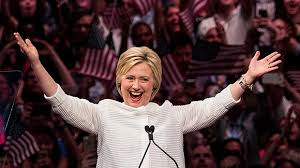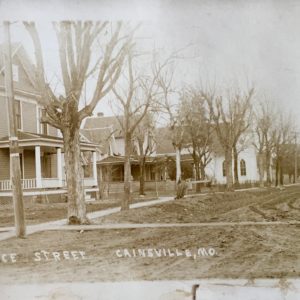Geoff Goodwin initiates Other Histories
When Hillary Clinton clinched the 2016 Democratic presidential nomination after the June 7 primaries, history was made. Hillary became the first woman to win the nomination of a major party. Even so, I didn’t feel the emotion of the moment like I had eight years earlier with Barack Obama’s nomination. I’ve always had mixed feelings about Hillary, so that was undoubtedly part of it. And since Hilary’s nomination was a foregone conclusion, some of the majesty of the moment was missing.
But Hillary’s nomination did turn my thoughts to my mother, Elaine, and I thought about what the moment would have meant to her. For Elaine, and for the other women of her generation who would have dared to imagine a woman as President, the announcement certainly would have been filled with the thrill of vindication. Perhaps even relief.
First, let me clarify, in the sense of having given birth to me, Elaine wasn’t really my mom. Yet in every other meaning of the word she was; Elaine was my mother for thirty-three years.
My “real” mom, Phyllis, birth mom, if you prefer that term, died when I was two. My father never spoke much about Phyllis and didn’t tell me she had died until I was 27 years old. Why do adults always think children are ignorant of the ways of the world? Of course I knew she was dead, I had known so since I was a very young kid.
And as a kid, not knowing how Phyllis died, I imagined the worst. I assumed she had died in child birth, but in fact her death was much more bizarre – she had a seizure while drawing a bath and drowned.
When I was six years old my dad married Elaine. I’d like to believe that love was part of the equation, and I think it was, but as with all marriages other factors were involved.
Some background, Elaine’s marriage to my dad was her second. In the 1930’s Elaine married a man she met while attending the University of Nebraska. His name was Howard and he too was a student at the University. Howard played baseball and basketball at school, he was what they called back then a Big Man on Campus.
A few years later, World War Two came along and Howard left the University to join the army. He became an army officer, a colonel if I remember correctly. After the war Howard stayed with the army a while longer to work at the Pentagon. When he eventually left the army Howard became an executive at General Electric and father to a daughter he and Elaine named Nancy. And for a brief while Howard and Elaine were living the American Dream.
But the dream didn’t last. In the early 1950’s Nancy was diagnosed with cancer and died a few months later; she was eight years old. Of course I wasn’t around then, but I know that something went out of Elaine, something she never got back, something that can only be caused by the death of a child.
And things got worse. A few years later, Howard died unexpectedly. And just like that, within the span of a few years, Elaine was alone.
Elaine had to take a job as a secretary (even though she had a college degree) at a medical clinic in Lincoln, Nebraska. She was working there when she met my dad, who was in the Air Force. I can imagine Elaine’s loneliness and despair at the time. She was likely very frightened of an uncertain future. Perhaps my dad sensed that in Elaine too. After she died we discovered Elaine had lied to my dad about her age when they first met, telling him she was 42, when in fact she was 52. It seems silly now, but it shows how trapped she felt by her situation.
I can’t say whether my dad and Elaine had a happy marriage, whatever that means. Certainly their marriage had its ups and downs. They both had health problems toward the end of their marriage and in a curious way that seemed to bring them closer together. They came to depend on each other as they never had before. Elaine died in 1995. My dad died in 2oo7.
Sometimes I think of how my life could have been different if I’d grown up with Phyllis as my mom. As I said, I don’t know much about Phyllis except she dropped out of high school to help support her family after her father died. I guess it’s unfair to speculate, since I know so little about her.
As for Elaine, besides giving me love, the greatest gift she gave me was a love of reading. I don’t know what my life would be without books -but that is a different story.
Elaine was a survivor, someone who suffered unimaginable loss and still kept going. I smile as I write this and imagine her drinking a cocktail somewhere, toasting Hillary, with Louis Armstrong playing ‘What a Wonderful World’ in the background.
Elaine’s hometown, Caineville, Missouri.

